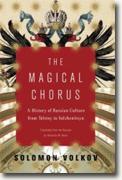The Magical Chorus
Solomon Volkov
book reviews:
· general fiction
· chick lit/romance
· sci-fi/fantasy
· graphic novels
· nonfiction
· audio books
· author interviews
· children's books @
curledupkids.com
· DVD reviews @
curledupdvd.com
newsletter
win books
buy online
links
home
for authors
& publishers
for reviewers

 |
The Magical Chorus: A History of Russian Culture from Tolstoy to Solzhenitsyn Solomon Volkov Knopf Hardcover 352 pages March 2008 |
|
Perhaps nowhere in the world and at no time in history has there been such an intimate relationship between politics and art as in the Soviet Union in the twentieth century.
This book begins with the death of Leo Tolstoy in 1910. Tolstoy was a god-like figure whose political views merged in his literature with his spiritual and social views in such a tangle that it was hard for the remarkable list of writers who followed him to be sure if they "should" adore or despise him. Certainly he was lionized outside of his native Russia, both for his masterful writing and his pacifist and aesthetic philosophy. His death, coming soon before the fall of the tsarist regime, marked a crux in the history of Russian literature. His legacy, reborn in the Stalinist era, was to be credited, rightly or wrongly, as the progenitor of Stalin's "socialist realism." "The true meaning of socialist realism, despite the thousands of articles and books attempting to explain it, remained quite elusive," says Volkov. Perhaps the definition is embodied in the writings of Michail Sholokhov, whose
And Quiet Flows the Don (its Western title) won the Stalin Prize (hand-picked by the Iron Man himself) and later the Nobel Prize. The dichotomy of Sholokhov's career is apparent
in his letters to Stalin regarding the Great Terror (the obliteration of the land-owning peasants in their millions) - a private plea for sanity and mercy. He described how Communist operatives "poured kerosene on the women's legs and hems of their skirts, set them on fire, and then put them out" with threats to repeat the process if the peasants didn't disclose the location of horded grain. The author of The Magical Chorus Boris Pasternak, whom Stalin did not immediately decry, fell from grace when he attempted to smuggle copies of Dr. Zhivago to the West. His career was a self-fulfilling prophecy: his mild denunciation of the Communist takeover did not immediately cause his downfall, but he was eaten away by guilt and fear in his later years and felt forced to reject the Nobel Prize when it was offered. Another noted writer who grappled with "socialist realism" was the outspoken poetess Anna Ahkmatova. Stalin's spokesman said she was "either a whore or a nun," a fair analysis, perhaps, of someone who had the courage to write anti-Stalinist poems but, as Volkov informs us, "rendered unto Caesar what was Caesar's when it was demanded." Composer Sergei Prokofiev believed that the regime would ultimately force musicians to turn their work into "something cheap, saccharine, or imitative." He moved to the West, where he found himself in competition with exiles Rachmaninoff and Stravinksy as émigré novelties whose work could never be taken entirely seriously. He later returned to Russia where he managed to compose some great pieces (Volkov described them as "a gulp of pure and fresh water") though many of the Russian intelligentsia dismissed them as "compromised." Vladimir Vysotsky was "more popular in Russia than the Beatles and Elvis Presley combined." With simple songs accompanied by guitar, he stationed himself in the troubadour tradition, singing about the common people, especially prisoners. He pleased both Right and Left and common people hummed his ditties, but he also was criticized by his artistic betters for the sin of being a bit too popular. According to Volkov, "Dissidents inside Russia were the first Soviet citizens to break the barrier of silence and mutual distrust with the West." Solzenitsyn, certainly the most vocal of them, bought a radio as soon as he was released from a prison camp in 1953 and listened continually to Western broadcasts for any hint of anti-Soviet propaganda. This is a book rich with history and anecdote, giving intimate pictures of some of Russia's greatest artists: Andrei Tarkovsky (film), Rudolf Nureyev, Sergei Diahgilev, and Maya Plisetskaya (dance), Pasternak, Gorky and Chekhov, to name but a few of the memorable writers. The author states that, in Stalin's mind, "novels had to play the part of lives of the saints, plays and films of religious mysteries, and paintings of icons." Gigantic images of Stalin and Lenin loomed over the populace like God the Father and his Son. Everyone in the Soviet Union - but most especially its artists, because they were treated with greater privilege - had to find a niche without attracting Stalin's evil rage. The long-term effects of fashioning a creative life amidst a constant undercurrent of terror is something that is just now being examined. This book pays tribute to those who struggled to survive. Originally published on Curled Up With A Good Book at www.curledup.com. © Barbara Bamberger Scott, 2008 |
|
|
|
 Click here to learn more about this month's sponsor! |
|
| fiction · sf/f · comic books · nonfiction · audio newsletter · free book contest · buy books online review index · links · · authors & publishers reviewers |
|
| site by ELBO Computing Resources, Inc. | |
 Solomon Volkov is a Russian émigré who has authored other books about the culture and arts of his native country - St. Petersburg: A Cultural History and Shostakovich and Stalin.
Solomon Volkov is a Russian émigré who has authored other books about the culture and arts of his native country - St. Petersburg: A Cultural History and Shostakovich and Stalin.